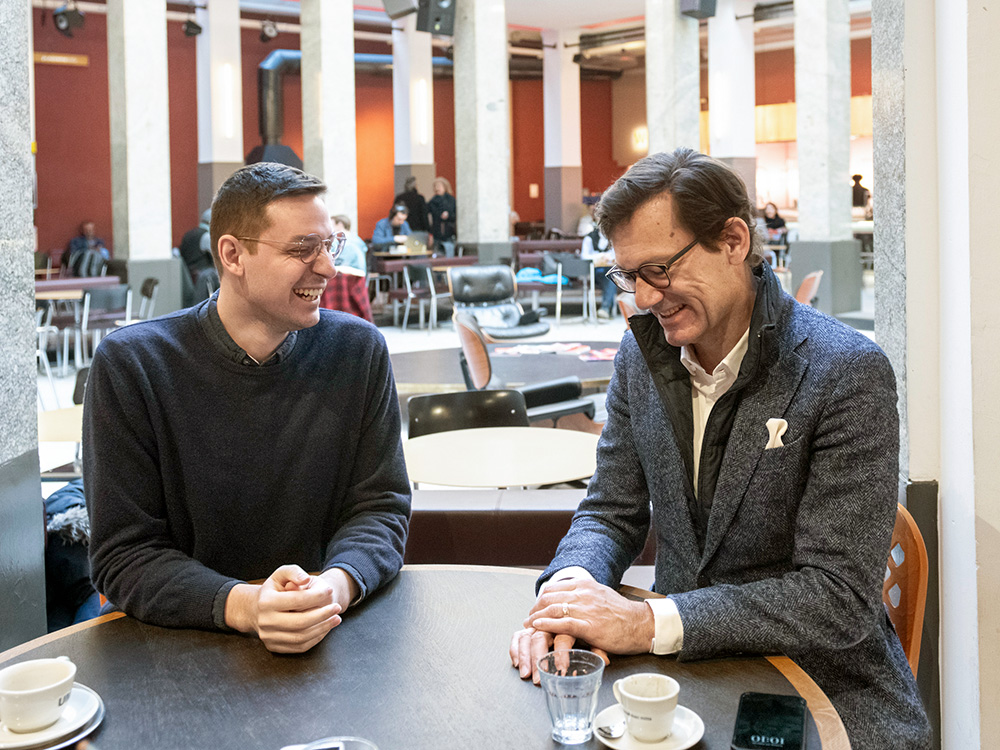It’s a match!
Interview: Marion Maurer
In a new mentoring program, alumni are engaged to support current students as they embark on their careers. Alumnus Daniel Hanimann and master’s student Kristi Cenolli explain why the program is valuable for both mentors and mentees.
AlumniBasel: Mr. Cenolli, Mr. Hanimann, you’re one of the pairs taking part in the pilot mentoring program. What made you decide to participate?
Kristi Cenolli: I had lots of questions about starting work and planning my career. In the mentoring program, I can talk to someone who has already been through this and can give me tips from inside the industry. I was really pleased when I was paired with Daniel, who’s a delegate at the Swiss National Bank with excellent connections in the business world.
Daniel Hanimann: At first, I was unsure whether I could contribute anything of real value and whether I should participate at all. I don’t have a career in the traditional sense. But it ultimately wasn’t about that – it was about the personal experiences that I could share. Plus, I have two sons who are in a situation similar to Kristi’s right now.
KC: I wasn’t sure whether to do a doctorate or not, and one of Daniel’s sons was wondering the same thing.
AlumniBasel: And what did you recommend, Daniel?
DH: I tell my sons to think about where they want to be in five to ten years. Then they can work out what steps they need to take now. Of course, that doesn’t mean they can never stray from their chosen path. Sometimes new opportunities arise along the way and that’s good. But it’s helpful to have a direction of travel.
KC: I’d like to work at the Swiss National Bank or the European Central Bank one day and I thought I’d need a doctorate for that. But after talking to Daniel, I’ve learned that while it would make the first step easier, there are also routes that don’t require one. Daniel doesn’t have a doctorate and he has a really interesting role at the SNB.
DH: Yes, the SNB gave me that opportunity. Diversity is a real priority here. I was lucky enough to be able to choose a career that aligned with my interests. In my current position at the SNB, I can use both my experience as a TV journalist and the knowledge I gained during my economics degree. It’s important to choose a degree in something you’re interested in. But during your studies, I think it also makes sense to explore your career options.
AlumniBasel: And that’s where the mentoring program comes in. How did you approach the meetings?
KC: I prepared a lot of questions. One thing I wanted to know was what companies expect: Who are they looking for and what do you need to bring to the table? The mentoring program isn’t about finding you a job or checking your CV. But if you use it correctly, you can gain a huge amount from your mentor’s experience and get exclusive tips. Daniel knows a great deal about many different industries and the dynamics of how they function.
DH: And for a master’s student, Kristi already has considerable life and work experience. He’s also very reflective, which makes it easier for me as a mentor. When someone comes to me with specific questions and also ideas, I can understand the person more quickly and so provide better support. Kristi’s ability to self-reflect, his curiosity and his courage in moving abroad really impressed me—and reminded me a bit of my younger self.
AlumniBasel: So participating in the mentoring program was a positive experience?
KC: More than anything, it’s an experience that will stay with me. What you learn during mentoring has a sustained, lasting impact—and not just on your career development. Another great aspect of the program is that it connects different generations.
DH: I absolutely agree—and I’d recommend all alumni of my age to become mentors. Of course, you don’t have to be as old as I am (laughs). We all have something to offer, whatever our age!
Daniel Hanimann studied business and economics at the University of Basel. After earning his master’s degree, he spent some 20 years as a journalist and presenter, including at Swiss broadcaster SRF. He has been a delegate for economic relations in the Northwestern Switzerland region at the Swiss National Bank since 2011.
Kristi Cenolli comes from Italy, where he earned a bachelor’s in environmental engineering and one in economics and management. After graduating, he worked as a business controller and is now studying for a master’s in economics and public policy at the University of Basel.
More articles in this issue of UNI NOVA (May 2024).

